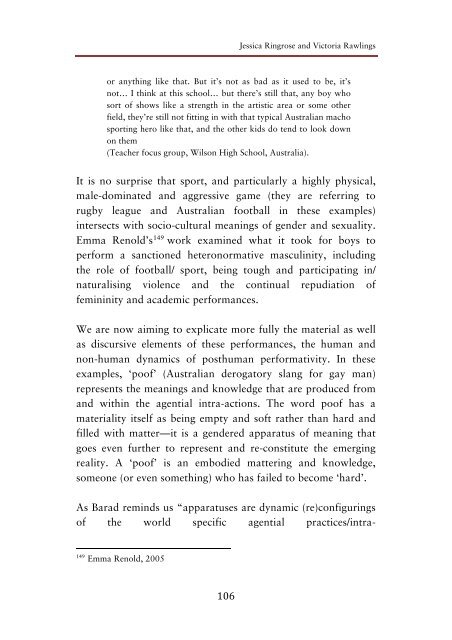You also want an ePaper? Increase the reach of your titles
YUMPU automatically turns print PDFs into web optimized ePapers that Google loves.
Jessica Ringrose and Victoria Rawlings<br />
or anything like that. But it’s not as bad as it used to be, it’s<br />
not… I think at this school… but there’s still that, any boy who<br />
sort of shows like a strength in the artistic area or some other<br />
field, they’re still not fitting in with that typical Australian macho<br />
sporting hero like that, and the other kids do tend to look down<br />
on them<br />
(Teacher focus group, Wilson High School, Australia).<br />
It is no surprise that sport, and particularly a highly physical,<br />
male-dominated and aggressive game (they are referring to<br />
rugby league and Australian football in these examples)<br />
<strong>inte</strong>rsects with socio-cultural meanings of gender and sexuality.<br />
Emma Renold’s 149 work examined what it took for boys to<br />
perform a sanctioned heteronormative masculinity, including<br />
the role of football/ sport, being tough and participating in/<br />
naturalising violence and the continual repudiation of<br />
femininity and academic performances.<br />
We are now aiming to explicate more fully the material as well<br />
as discursive elements of these performances, the human and<br />
non-human dynamics of posthuman performativity. In these<br />
examples, ‘poof’ (Australian derogatory slang for gay man)<br />
represents the meanings and knowledge that are produced from<br />
and within the agential intra-actions. The word poof has a<br />
materiality itself as being empty and soft rather than hard and<br />
filled with matter—it is a gendered apparatus of meaning that<br />
goes even further to represent and re-constitute the emerging<br />
reality. A ‘poof’ is an embodied mattering and knowledge,<br />
someone (or even something) who has failed to become ‘hard’.<br />
As Barad reminds us “apparatuses are dynamic (re)configurings<br />
of the world specific agential practices/intra-<br />
149<br />
Emma Renold, 2005<br />
106


